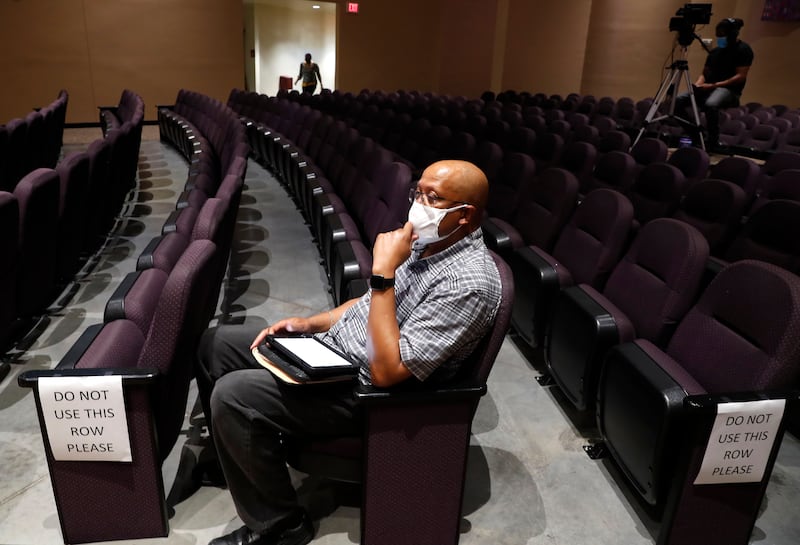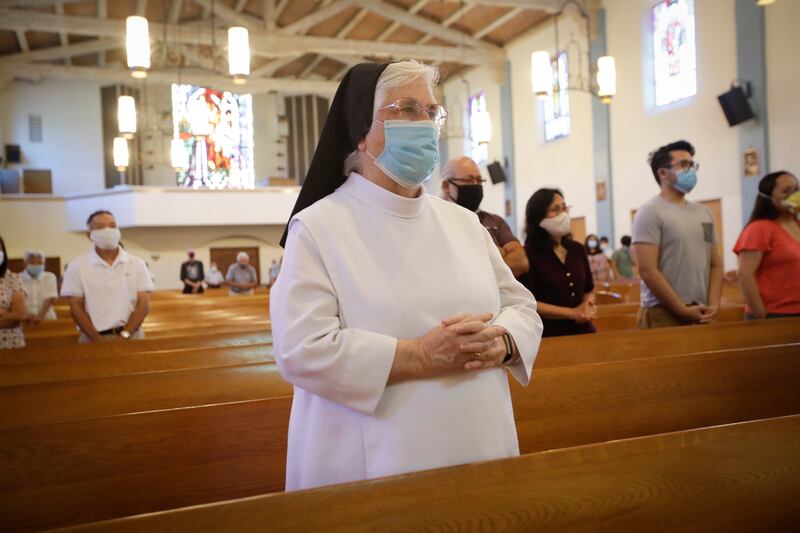SALT LAKE CITY — Earlier this month, Texas Gov. Greg Abbott unveiled a statewide mask mandate aimed at stopping the recent surge in COVID-19 cases. Most Texans must now cover their face when they’re grocery shopping, attending a protest or awaiting a table at the barbecue place down the street.
The policy, like other mask mandates, offers several exemptions, including to residents with health conditions and children under age 10. Nearly all make sense in light of health and safety guidelines, but the exception for anyone at a religious service is harder to explain.
“Abbott has given quite a bit of deference to religious communities,” said Jeremy Dys, special counsel for litigation and communications at First Liberty, a religious liberty-focused law firm based in Plano, Texas.
So have many other officials across the country, despite warnings that worship services can be ideal environments for spreading COVID-19.
Ohio’s mask mandate exempts religious officiants. Phoenix’s protects people with a faith-based objection to face coverings. In Nashville, as in Texas, you can remove your mask when you enter a church.

In these and other places, government officials are respecting religious freedom protections and enabling leaders of churches, synagogues and mosques to make their own rules, said Dys, who supports this approach.
Faith leaders “can take recommendations from state officials and then, at the individual level, make the decisions they deem best,” he said.
Most decide on their own to require, or at least encourage, their members to wear masks. But the question remains: Should policymakers be doing more to keep worshippers safe?
Risking infection at church
The infection risk posed by in-person worship services has been clear since the early days of the pandemic. In February, South Korean officials identified a megachurch as the source of around half of their country’s first 1,000 cases. In March, nearly half of the attendees at a choir practice in a church in Washington state developed COVID-19 symptoms and two eventually died.
Churches are “an ideal setting for transmission,” said Carlos del Rio, an infectious disease specialist at Emory University, to The New York Times earlier this month. “You have a lot of people in a closed space. And they’re speaking loudly (and) they’re singing. All those things are exactly what you don’t want.”
These risk factors help explain why most government officials included houses of worship in the gathering bans they put in place this spring. Some faced religious freedom lawsuits as a result, but courts generally upheld policies that treated churches no worse than secular gathering spaces.
“Religious congregations can’t be singled out for special disfavor,” said Michael Moreland, director of the Center for Law, Religion and Public Policy at Villanova University. However, during a public health crisis, officials aren’t required to leave them alone.
In the context of mask mandates, that means it’s legal for city or state officials to force worshippers to wear face coverings if they demand the same of people at other, similar events. Religious exemptions to the policies aren’t required by law, Moreland said.
“I think courts are going to continue, even many months into the pandemic, to give deference to public health authorities, so long as they don’t see selective enforcement,” he said.
Still, the threat of lawsuits likely helps explain why some states and cities exempt churches from mask mandates, Dys said. Officials probably want to avoid the bad press and broad outcry stemming from earlier battles over group gathering bans.
“They still strongly encourage people to wear masks” but stop short of requiring it, he said.
Mixed reactions
Some people of faith see this approach as dangerous, arguing that public safety should outweigh potential religious freedom concerns.
For example, Massimo Faggioli, a professor of religious studies at Villanova University, recently tweeted that respect for religious beliefs has been taken too far.
“The exceptions ‘for religious reasons’ to mandatory masks in public is one of the signs of madness in this country,” he said.
However, many religious leaders appreciate being trusted to decide what’s best for their congregation, Dys said. In synagogues that don’t use microphones on the Sabbath and churches that offer communion, masks make it harder to hear and participate in the service.
“There are very many religious institutions that can’t conduct their worship with a mask on,” he said.
The Rev. David Fannin, who leads Nassau Bay Baptist Church in Houston told the Baptist Press in May that a mask mandate would cause nearly as much tension as a coronavirus outbreak.
“We have people who think everybody should wear a mask because they have some autoimmune disease or something or just feel everybody should,” he said. “And then we have others who think it’s ridiculous that anyone would wear a mask.”
Until we see a surge in church-linked cases, it’s wise for government officials to resist interfering with houses of worship, Dys said. So far, there have only been around 650 COVID-19 cases linked to religious gatherings in the U.S.
“There are some in our country that seek to shift blame onto religious people,” he said. “But 650 total cases since March does not meet the definition of a massive outbreak.”


 alt=Kelsey Dallas
alt=Kelsey Dallas